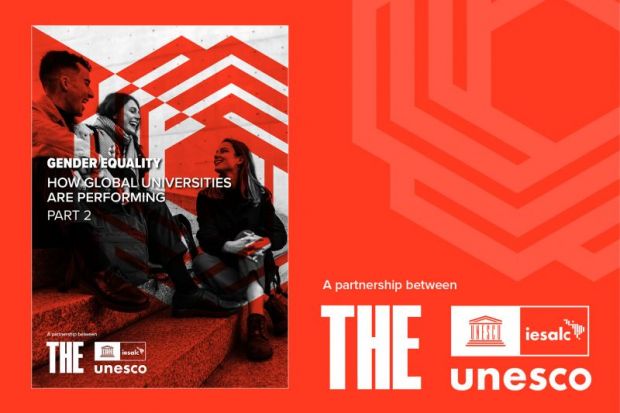Report details how universities can improve on tackling gender inequality
- Report from UNESCO-IESALC and Times Higher Education examines global data on academics and students, as well as performance of 938 universities that are committed to tackling gender inequality
- Women make up more than half of higher education students, but they are underrepresented as lecturers, researchers and particularly leaders
- Increasing numbers of universities globally are reporting data on their performance on gender equality indicators, with particular growth in Asia
- Universities need to introduce more initiatives that track success rates and outcomes for women, compared with men
- Discussions on gender equality need to become more nuanced and move beyond focusing only on increasing the number of women in STEM subjects
Research released by the UNESCO International Institute for Higher Education in Latin America and the Carribbean (IESALC) and Times Higher Education (THE) today reveals the extent to which higher education institutions across the globe are contributing to gender equality and provides recommendations on the next steps universities can take to continue making progress in this area.
The report Gender equality: How global universities are performing – part 2, which will be presented at the UNESCO World Higher Education Conference 2022 in Barcelona, includes a detailed literature review; worldwide, regional and country-level analysis on UNESCO and THE data; and 10 recommendations for universities across the world. It reflects on the unique role that universities play in helping to address the United Nations’ Sustainable Development Goals (SDGs), including SDG 5: gender equality and empowering all women and girls.
The literature review includes data on the areas of female underrepresentation in academia, information on government interventions to promote female leadership in higher education institutions (including five country case studies), and details of gender equality practices in higher education institutions relating to teaching and learning, research, engagement and administration and management.
Despite making up more than half of higher education students, women are underrepresented as lecturers, researchers and particularly leaders. But more governments are developing policies to increase the number of women in leadership positions, in general and within higher education institutions.
The report also finds that increasing numbers of universities globally are reporting data on their performance on gender equality indicators, with particular growth in Asia.
Analysis of data directly provided by 938 universities across the world on their contributions to achieve SDG 5 finds that in all regions, universities are more likely to focus on providing access and support to women than on measuring their progress and success. The report calls for universities to introduce more initiatives that track success rates and outcomes for women, compared with men.
While discussions on improving gender equality in academia often focus on increasing the number of women in STEM (science, technology, engineering and mathematics) subjects, the data show that not all STEM subjects suffer from female underrepresentation at the student level; there are more female than male students in life sciences, for example. However, the share of female students is increasing in all subjects, meaning that some disciplines are becoming more and more female-heavy. At the same time, there is underrepresentation of male students in many “caring” subjects, such as psychology and education.
One of the report's recommendations is for universities to examine trends at a more granular discipline level to ensure that gender equality measures are targeted appropriately.
The report also calls for higher education institutions to devise a comprehensive approach to tackling gender inequality that involves the entire university community, go beyond national policies and laws relating to gender equality, regularly collect and analyse gender-disaggregated data, ensure that policies and services are widely communicated and implemented, and engage with gender equality experts in other sectors outside higher education.
The first report on gender equality from UNESCO-IESALC and THE was published in March on International Women’s Day and included worldwide and country-level analysis on THE data across 18 different indicators, as well as case studies from five universities that are leading on this work in their regions.
NOTES FOR EDITORS
UNESCO World Higher Education Conference 2022
The key findings from the two reports will be analysed during a session at the UNESCO World Higher Education Conference on 20 May (11.15-12.45 CEST). The session will also hear from rectors at two case study institutions about how their institutions are bringing about change. Find out more about the event and register here.
About THE
THE is the trusted global data partner for higher education. With five decades of expertise in the sector, 30 million unique website users in 2020 and more institutions participating in our flagship university rankings than any other major provider, we draw on millions of individual data points to offer deeper and richer insight into global university performance than anyone else. From powerful data-driven insights and strategic consultancy support to agenda-setting events and hiring solutions, our products and services enable everyone in higher education to make smarter, more informed decisions.
About UNESCO International Institute for Higher Education in Latin America and the Caribbean (IESALC)
The UNESCO International Institute for Higher Education in Latin America and the Caribbean (IESALC) is the only specialized institute of the United Nations system with the mission to contribute to the improvement of higher education in member States. Through research, capacity-building, technical cooperation, and concerted advocacy, IESALC's portfolio of projects contribute to the development of higher education systems on the basis of the Sustainable Development Goals, also helping to guarantee the relevance, quality, efficiency and equity of HE activities and the fostering of international cooperation.
***ENDS***
